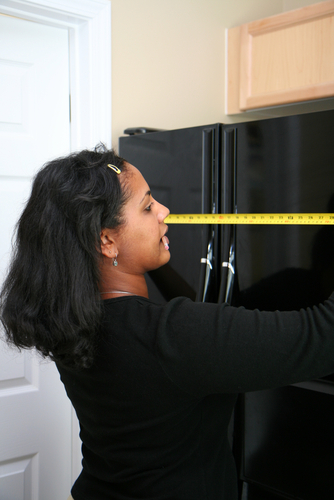Upgrade Refrigerator/Freezer
Did you know, refrigerators and freezers have become over 200% more efficient in the last 25 years? That’s a big improvement! Depending on when your refrigerator was manufactured, you could save up to $300 a year or more by replacing it with a new, energy-efficient model. Read on to learn more about your potential savings and the best time to upgrade.
Your Impact
Action Steps & Tips
Introduction

The energy efficiency of refrigerators and freezers has increased by over 200% in the last 25 years. That’s a big improvement!
Depending on when your refrigerator was manufactured, you could save up to $300 a year or more by replacing it with a new, energy-efficient model! Read on to learn about your potential savings and the best time to upgrade.
1Step 1. Figure out your potential savings and when to upgrade
New refrigerators and freezers are far more energy efficient than older models. To determine your potential savings, find the year your refrigerator was built and its size. Then use the Energy Star Flip Your Fridge calculator to find your estimated savings or follow the basic guide below. Generally, if your fridge is older than 2001, it makes sense to upgrade.
If your refrigerator was manufactured before 1993: You can save up to $300 a year or more (depending on your local electricity prices, refrigerator size and age) by upgrading to a new energy efficient refrigerator. New efficient refrigerators range between $1,000-$2,000 or more (depending on the size and features you choose). Your new refrigerator could pay for itself in energy savings within 3-6 years and provide additional savings every year after that.
Refrigerators built from 1993 to 2000: You can save up to $100 or more a year by upgrading. This means your refrigerator will likely pay for itself during its lifetime, which is generally 10-20 years.
2001 or later: Savings are smaller the newer your fridge is, generally under $50 a year. Savings are even smaller with models newer than 2010. If your fridge is still working well, it makes sense to continue using it until it has reached the end of its useful life.
Freezers. Annual energy savings for freezer-only units are generally lower than for refrigerators.
2Step 2. Choose your new fridge—energy saving options
Choose Energy Star. Although all new refrigerators are energy-efficient, Energy Star rated models save more energy and money. The good news is there are Energy Star options in all price categories. Look for the Energy Star label—a yellow sticker that shows the energy efficiency ratings for that model.
Choose the right size. It's better to have one refrigerator that is big enough for your family rather than purchasing an extra one later on. However, if it is too big, you're paying extra to chill empty space. Since a refrigerator lasts up to 20 years, think about your long-term space needs. Generally, 4-6 cubic feet per person is standard. A 20 cubic foot model would generally work well for a household of four.
The design. Models with freezers above refrigerators tend to be the most energy efficient and trouble-free. They also tend to be less expensive. Models with the freezer below the refrigerator is also a relatively efficient design. Side-by-side freezer and refrigerator units offer easy access, but are typically the least energy efficient option. Accessories can also make a difference. Automatic ice makers, for example, can increase the energy use of a refrigerator by up to 40%.
3Step 3. Install your new fridge and recycle your old one
Schedule delivery and install your new fridge!
It is important to properly dispose of your old refrigerator. Refrigerators contain chemicals that can create severe environmental damage, including ozone-depleting substances, climate pollutants, mercury, and PCBs. Some common substances found in refrigerators are 10,000 times more powerful climate pollutants than carbon dioxide. Federal law requires appliances with hazardous substances be properly disposed of or recycled.
Many appliance retailers will pick up and dispose of your old refrigerator or freezer when they deliver your new model. There may be an additional fee for this service. If this option is not available, check with your local garbage hauler or recycling company to find out where to take your old fridge for safe disposal.

